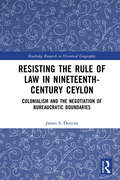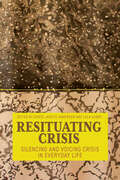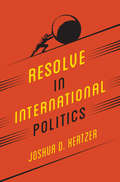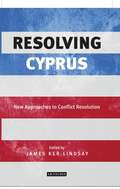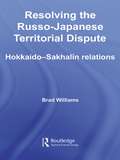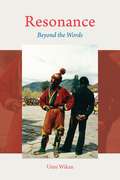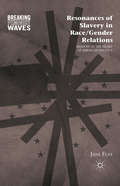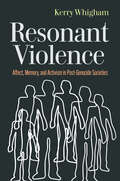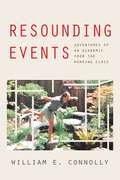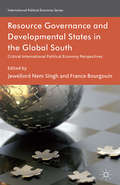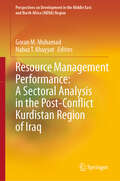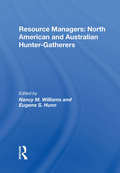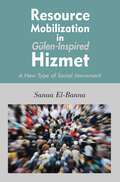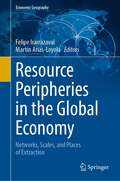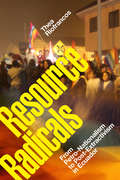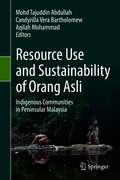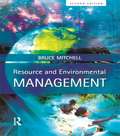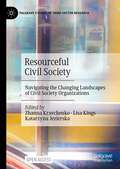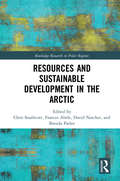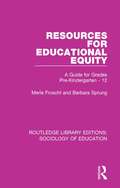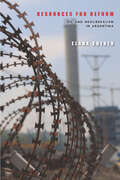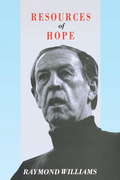- Table View
- List View
Resisting the Rule of Law in Nineteenth-Century Ceylon: Colonialism and the Negotiation of Bureaucratic Boundaries (Routledge Research in Historical Geography)
by James S. DuncanThis book offers in-depth insights on the struggles implementing the rule of law in nineteenth century Ceylon, introduced into the colonies by the British as their “greatest gift.” The book argues that resistance can be understood as a form of negotiation to lessen oppressive colonial conditions, and that the cumulative impact caused continual adjustments to the criminal justice system, weighing it down and distorting it. The tactical use of rule of law is explored within the three bureaucracies: the police, the courts and the prisons. Policing was often “governed at a distance” due to fiscal constraints and economic priorities and the enforcement of law was often delegated to underpaid Ceylonese. Spaces of resistance opened up as Ceylon was largely left to manage its own affairs. Villagers, minor officials, as well as senior British government officials, alternately used or subverted the rule of law to achieve their own goals. In the courts, the imported system lacked political legitimacy and consequently the Ceylonese undermined it by embracing it with false cases and information, in the interests of achieving justice as they saw it. In the prisons, administrators developed numerous biopolitical techniques and medical experiments in order to punish prisoners’ bodies to their absolute lawful limit. This limit was one which prison officials, prisoners, and doctors negotiated continuously over the decades. The book argues that the struggles around rule of law can best be understood not in terms of a dualism of bureaucrats versus the public, but rather as a set of shifting alliances across permeable bureaucratic boundaries. It offers innovative perspectives, comparing the Ceylonese experiences to those of Britain and India, and where appropriate to other European colonies. This book will appeal to those interested in law, history, postcolonial studies, cultural studies, cultural and political geography.
Resituating Crisis: Silencing and Voicing Crisis in Everyday Life
by Dorte Jagetic Andersen Lola AubryThe world is increasingly influenced by ongoing crisis, or at least this is what mainstream media and politics wants us to believe. When portrayed here, crisis most often comes in the form of situations challenging a sense of normality, such as with violent conflicts, pandemics, or forced migration. However, crisis is not just a situation twisting normality but can become constitutive of normality itself. In exploring transformative and constructive elements to being in crisis, this volume resituates the view on crisis in everyday life to foster critical and nuanced examination of discourses on and experiences of it.
Resolve in International Politics
by Joshua D. KertzerWhy do some leaders and segments of the public display remarkable persistence in confrontations in international politics, while others cut and run? The answer given by policymakers, pundits, and political scientists usually relates to issues of resolve. Yet, though we rely on resolve to explain almost every phenomenon in international politics--from prevailing at the bargaining table to winning on the battlefield--we don't understand what it is, how it works, or where it comes from. Resolve in International Politics draws on a growing body of research in psychology and behavioral economics to explore the foundations of this important idea.Joshua Kertzer argues that political will is more than just a metaphor or figure of speech: the same traits social scientists and decision-making scholars use to comprehend willpower in our daily lives also shape how we respond to the costs of war and conflict. Combining laboratory and survey experiments with studies of great power military interventions in the postwar era from 1946 to 2003, Kertzer shows how time and risk preferences, honor orientation, and self-control help explain the ways leaders and members of the public define the situations they face and weigh the trade-offs between the costs of fighting and the costs of backing down.Offering a novel in-depth look at how willpower functions in international relations, Resolve in International Politics has critical implications for understanding political psychology, public opinion about foreign policy, leaders in military interventions, and international security.
Resolving Community Conflicts and Problems: Public Deliberation and Sustained Dialogue
by Roger Lohmann Jon Van TilPublic deliberation and group discussion can strengthen the foundations of civil society, even when the groups engaged in debate share a history of animosity. Scholars have begun to study the dialogue sustaining these conversations, especially its power to unite and divide groups and individuals. The twenty-four essays in this collection analyze public exchanges and the nature of sustained dialogue within the context of race relations, social justice, ethnic conflicts, public-safety issues, public management, community design, and family therapy. They particularly focus on college campuses and the networks of organizations and actors that have found success there. Open discussion may seem like an idealistic if not foolhardy gesture in such milieus, yet in fact the practice proves crucial to establishing and reinforcing civic harmony.
Resolving Cyprus: New Approaches to Conflict Resolution
by James Ker-Lindsay<p>Over the past fifty years the Cyprus Problem has come to be regarded as the archetype of an intractable ethnic conflict. Since 1964, the United Nations has been at the forefront of efforts to find a political solution to the dispute between the island’s Greek and Turkish communities. And yet, despite the active involvement of six Secretaries-General (U Thant, Kurt Waldheim, Javier Perez de Cuellar, Boutros Boutros Ghali, Kofi Annan and Ban Ki-Moon), every attempt to reach a mutually acceptable solution has failed. <p>Here, James Ker-Lindsay draws together new and original perspectives from the leading experts on Cyprus, including academics, policy-makers, politicians and activists. All have addressed one deceptively simple question: ‘Can Cyprus be solved?’ Resolving Cyprus presents a comprehensive overview of the Cyprus Problem from a variety of approaches and offers new and innovative ideas as to how to tackle one of the longest running ethnic conflicts on the world stage. This represents an essential contribution to the body of work on Cyprus, and will be required reading for all those following the debates surrounding the Cyprus problem.</p>
Resolving the Russo-Japanese Territorial Dispute: Hokkaido-Sakhalin Relations (Nissan Institute/Routledge Japanese Studies #10)
by Brad WilliamsThe unresolved territorial dispute between Japan and Russia over the South Kuril Islands/Northern Territories remains the largest obstacle to concluding a peace treaty and fully normalising bilateral relations between the two nations. This book traces the evolution of transnational relations between subnational public authorities in Hokkaido and Sakhalin, examining the interrelationship between these ties and the Russo-Japanese territorial dispute. The book investigates why the development of Hokkaido-Sakhalin relations has failed to create, at the subnational level, an environment conducive to resolving (kankyo seibi) the South Kuril Islands/Northern Territories dispute. Brad Williams suggests that kankyo seibi has not worked primarily because Russia’s troubled transition to a liberal democratic market economy has manifested itself in ways that have ultimately increased the South Kuril Islands’ intrinsic and instrumental value for the Sakhalin public and regional elite. This in turn has limited the impact from the twin transnational processes of cultural and economic exchange in alleviating opposition to the transferral of these disputed islands to Japan. Drawing upon a wealth of primary and secondary sources from both countries, this book utilises levels of analysis and an analytical framework that incorporates national and subnational, as well as governmental and non-governmental forces to discuss a relatively unexplored aspect of Russo-Japanese relations. As such, Resolving the Russo-Japanese Territorial Dispute will appeal to students and scholars of Asian politics, international relations and post-communist states.
Resonance: Beyond the Words
by Unni WikanResonance gathers together forty years of anthropological study by a researcher and writer with one of the broadest fieldwork résumés in anthropology: Unni Wikan. In its twelve essays—four of which are brand new—Resonance covers encounters with transvestites in Oman, childbirth in Bhutan, poverty in Cairo, and honor killings in Scandinavia, with visits to several other locales and subjects in between. Including a comprehensive preface and introduction that brings the whole work into focus, Resonance surveys an astonishing career of anthropological inquiry that demonstrates the possibility for a common humanity, a way of knowing others on their own terms. Deploying Clifford Geertz’s concept of “experience-near” observations —and driven by an ambition to work beyond Geertz’s own limitations—Wikan strives for an anthropology that sees, describes, and understands the human condition in the models and concepts of the people being observed. She highlights the fundamentals of an explicitly comparative, person-centered, and empathic approach to fieldwork, pushing anthropology to shift from the specialist discourses of academic experts to a grasp of what the Balinese call keneh— the heart, thought, and feeling of the real people of the world. By deploying this strategy across such a range of sites and communities, she provides a powerful argument that ever-deeper insight can be attained despite our differences.
Resonances of Slavery in Race/Gender Relations: Shadow at the Heart of American Politics
by Jane FlaxJane Flax argues that a reciprocal relationship exists between unconscious processes and race/gender domination and that unless we attend to these unconscious processes, no adequate remedy for the malignant consequences of our current race/gender practices and relations can be devised. Flax supports her arguments using a variety of sources.
Resonant Violence: Affect, Memory, and Activism in Post-Genocide Societies (Genocide, Political Violence, Human Rights)
by Kerry WhighamFrom the Holocaust in Europe to the military dictatorships of Latin America to the enduring violence of settler colonialism around the world, genocide has been a defining experience of far too many societies. In many cases, the damaging legacies of genocide lead to continued violence and social divisions for decades. In others, however, creative responses to this identity-based violence emerge from the grassroots, contributing to widespread social and political transformation. Resonant Violence explores both the enduring impacts of genocidal violence and the varied ways in which states and grassroots collectives respond to and transform this violence through memory practices and grassroots activism. By calling upon lessons from Germany, Poland, Argentina, and the Indigenous United States, Resonant Violence demonstrates how ordinary individuals come together to engage with a violent past to pave the way for a less violent future.
Resounding Events: Adventures of an Academic from the Working Class
by William E. ConnollyWinner, David Easton Award for Political Theory, 2023In Resounding Events, one of the world’s preeminent political theorists reflects on a career as an academic hailing from the working class. From youthful experiences of McCarthyism, to the resurgence of white evangelicalism, to the advent of aspirational fascism and the acceleration of the Anthropocene, Connolly traces a career spent passionately engaged in making a more just, diverse, and equitable world. He surveys the shifting ground upon which politics can be pursued; and he discloses how to be an intellectual in universities that today do not encourage that practice.Far more than a memoir, Resounding Events probes the concerns that have animated Connolly’s work across more than a dozen books by tracing the bumpy imbrications of event, memory and thinking in intellectual life. Connolly experiments with ways to capture various voices that mark a self at any time. An event, as he elaborates it, is what disturbs or inspires thinking as it activates layered sheets of memory. A memory sheet itself assembles recollections, dispositions organized from the past, and vague remains that carry efficacies.Resounding Events shows how resonances between event and memory can help forge new concepts better adjusted to an emergent situation. Addressing tensions between working class experience and norms of the academy, his father’s coma, antiwar protests, the growing disaffection of the white working class, the neoliberalization of the university, climate denialism, and his sister’s experience with workers shifting to Trump, Connolly shows how engaged intellectuals become worthy of the events they encounter.
Resource Governance and Developmental States in the Global South
by Jewellord Nem Singh F. BourgouinThe political economy landscape has shifted as multinational corporations increase their investment efforts, changing the geographies of extraction. The contributors make the argument for the need of new theoretical perspectives anchored in critical political economy to address structural dynamics in the global industry.
Resource Guide for Food Writers
by Gary AllenFirst published in 1999. Routledge is an imprint of Taylor and Francis, an informa company.
Resource Management Performance: A Sectoral Analysis in the Post-Conflict Kurdistan Region of Iraq (Perspectives on Development in the Middle East and North Africa (MENA) Region)
by Nabaz T. Khayyat Goran M. MuhamadThis book investigates the intricacies of resource management performance across various sectors within the Kurdistan Region of Iraq. With 13 in-depth studies, it examines the region's evolution from an agricultural society to an emerging market since the collapse of the Saddam Hussein regime in 2003. Oil and gas revenue, comprising over 85 percent of fiscal revenues, has attracted multinational companies and international humanitarian organizations, although external factors such as the ISIS conflict and global economic downturns have hindered their performance. Additionally, conflicts with Baghdad and the fallout of the ISIS war have led to double embargoes and economic crises, exacerbated by the region's provision for 2 million refugees and internally displaced persons. International entities like the IOM and UNDP have played vital roles in supporting the region's development amid these challenges. Despite these obstacles, the Kurdistan Region demonstrates significant economic potential. By scrutinizing resource management in sectors such as education and electricity, this book offers valuable insights and policy recommendations for researchers, decision-makers, and organizations invested in the region's growth and stability.
Resource Managers: North American And Australian Hunter-Gatherers
by Eugene S. Hunn Nancy M. WilliamsAs environmental management becomes of increasing concern to both industrial and developing societies, it is instructive to look at the fundamental relationship between man and environment as exemplified by the hunter-gatherer cultures, in which resource management was and is vital to the very existence of human life. The authors of this book look at hunting and gathering societies in Australia and North America, searching for the essential, as distinct from local, manifestations of human-environment relations. They examine the availability of resources in relation to the requirements of stable and expanding human populations, explore the ontological and structural principles of ecological relations in these societies, and describe the rationale of geographic boundaries and control of access to resources within and across boundaries. A number of current theoretical issues are addressed: the use of fire as a tool for environmental management; the ecological consequences of seasonal mobility patterns; the functional basis for differing forms of control over resources; the social organization of production, including the symbolism of the sexual division of labor; the tactical exercise of jural rights in the use of resources; and the ecological consequences of religious beliefs. The book concludes with a summary of the case materials in terms of what they contribute to the understanding of hunting/gathering as an "economic" category and to the conflict over management of natural resources where societies of hunter-gatherers are encapsulated within industrial societies.
Resource Mobilization in Gulen-Inspired Hizmet
by Sanaa El-BannaThis scholarly book presents a case study of some of the London-based work of a social movement known as Hizmet, or the Gulen Movement. This transnational faith-inspired movement represents a rising trend of philanthropic social activism around the world and increasingly now in the Muslim world. This book grew out of the author's deep interest in Muslims' interaction with modern society, their social activism, and their response and contributions to global transformation. The author provides a unique insight into the Hizmet Movement, how it draws on Islamic resources, how it should be classified, and how it differs from other social movements.
Resource Peripheries in the Global Economy: Networks, Scales, and Places of Extraction (Economic Geography)
by Felipe Irarrázaval Martín Arias-LoyolaThis book discusses the conditions that underpin configuration of specific places as resource peripheries and the consequences that such a socio-spatial formation involves for those places. The book thereby provides an interdisciplinary approach underpinned by economic geography, political ecology, resource geography, development studies and political geography. It also discusses the different technological, political and economic changes that make the ongoing production of resource peripheries a distinctive socio-spatial formation under the global economy. Through a global and interdisciplinary perspective that uncovers ongoing political processes, socio-economic changes and socio-ecological dynamics at resource peripheries, this book argues that it is critical to take a more profound appraisal about the socio-spatial processes behind the contemporary way in which capitalism is appropriating and transforming nature.
Resource Radicals: From Petro-Nationalism to Post-Extractivism in Ecuador (Radical Américas)
by Thea RiofrancosIn 2007, the left came to power in Ecuador. In the years that followed, the “twenty-first-century socialist” government and a coalition of grassroots activists came to blows over the extraction of natural resources. Each side declared the other a perversion of leftism and the principles of socioeconomic equality, popular empowerment, and anti-imperialism. In Resource Radicals, Thea Riofrancos unpacks the conflict between these two leftisms: on the one hand, the administration's resource nationalism and focus on economic development; and on the other, the anti-extractivism of grassroots activists who condemned the government's disregard for nature and indigenous communities. In this archival and ethnographic study, Riofrancos expands the study of resource politics by decentering state resource policy and locating it in a field of political struggle populated by actors with conflicting visions of resource extraction. She demonstrates how Ecuador's commodity-dependent economy and history of indigenous uprisings offer a unique opportunity to understand development, democracy, and the ecological foundations of global capitalism.
Resource Use and Sustainability of Orang Asli: Indigenous Communities in Peninsular Malaysia
by Mohd Tajuddin Abdullah Aqilah Mohammad Candyrilla Vera BartholomewComprising of 18 sub-ethnic groups the indigenous communities, or better known as the Orang Asli, located in the Peninsular Malaysia, is a unique community in terms of their culture, lifestyle, and heritage. The life of the Orang Asli, popularly referred to as the Forest People, is highly intertwined with forest resources which makes the community a great source of information and traditional knowledge, particularly in the use of medicinal plants. This book covers three important issues to explain and gain insights into the sustainability of the Orang Asli:Social and demographicsSustainability of resource useGovernance, administration and management The book presents research to help bridge the gaps and provides a baseline reference for further research regarding the sustainability of the Orang Asli. This book is intended for researchers and graduate students to help gain an understanding of the Orang Asli. By highlighting the plight of Orang Asli the authors hope that this community will be recognised and become a part of society. More research is required to help the 178,197 Orang Asli achieve the sustainable development goals for their community in the Peninsular Malaysia.
Resource and Environmental Management
by Bruce MitchellThis book does an exceptional job in giving an understanding of change, complexity, uncertainty and conflict as well as their linkages, including awareness of strategies, methods and techniques to handle them relative to resource and environmental management. The text enhances the reader's capacity to conduct practice and conduct research in resource and environmental management.
Resourceful Civil Society: Navigating the Changing Landscapes of Civil Society Organizations (Palgrave Studies in Third Sector Research)
by Katarzyna Jezierska Zhanna Kravchenko Lisa KingsThis open access book examines how civil society organizations in Poland, Russia, and Sweden (re)act to transformations of opportunities and limitations in access to various forms of resources. The volume’s contributions discuss the constraints associated with different types of resources as well as organizations’ capacities to generate resources—or compensate for their lack—as they negotiate and contest barriers. The resourcefulness of civil society is revealed to be rooted in a variety of capabilities: converting resources, eliciting organizational change, and metamorphosing in response to organizational and environmental development.
Resources and Sustainable Development in the Arctic (Routledge Research in Polar Regions)
by David Natcher Chris Southcott Frances Abele Brenda ParleeOver the past thirty years we have witnessed a demand for resources such as minerals, oil, and gas, which is only set to increase. This book examines the relationship between Arctic communities and extractive resource development. With insights from leading thinkers in the field, the book examines this relationship to better understand what, if anything, can be done in order for the development of non-renewable resources to be of benefit to the long-term sustainability of these communities. The contributions synthesize circumpolar research on the topic of resource extraction in the Arctic, and highlight areas that need further investigation, such as the ability of northern communities to properly use current regulatory processes, fiscal arrangements, and benefit agreements to ensure the long-term sustainability of their culture communities and to avoid a new path dependency This book provides an insightful summary of issues surrounding resource extraction in the Arctic, and will be essential reading for anyone interested in environmental impact assessments, globalization and Indigenous communities, and the future of the Arctic region.
Resources for Educational Equity: A Guide for Grades Pre-Kindergarten - 12 (Routledge Library Editions: Sociology of Education #25)
by Barbara Sprung Merle FroschlThis title, first published in 1988, provides a comprehensive compilation of resources to help teachers and policy makers locate the materials they need to create equitable curriculum and classroom environments. While its primary focus is on girls and women, Resources for Educational Equity takes a comprehensive approach to equity encompassing concerns of gender, race, and disability. This title will be of interest to both students of education and to educators.
Resources for Reform: Oil and Neoliberalism in Argentina
by Elana SheverWhile most people live far from the sites of oil production, oil politics involves us all. Resources for Reformexplores how people's lives intersect with the increasingly globalized and concentrated oil industry through a close look at Argentina's experiment with privatizing its national oil company in the name of neoliberal reform. Examining Argentina's conversion from a state-controlled to a private oil market, Elana Shever reveals interconnections between large-scale transformations in society and small-scale shifts in everyday practice, intimate relationships, and identity. This engaging ethnography offers a window into the experiences of middle-class oil workers and their families, impoverished residents of shanty settlements bordering refineries, and affluent employees of transnational corporations as they struggle with rapid changes in the global economy, their country, and their lives. It reverberates far beyond the Argentine oil fields and offers a fresh approach to the critical study of neoliberalism, kinship, citizenship, and corporations.
Resources of Hope
by Raymond WilliamsCollected essays and talks from one of Britain's great thinkers, ranging across political and cultural theory Raymond Williams possessed unique authority as Britain's foremost cultural theorist and public intellectual. Informed by an unparalleled range of reference and the resources of deep personal experience, his life's work represents a patient, exemplary commitment to the building of a socialist future. This book brings together important early writings including "Culture is Ordinary," "The British Left," "Welsh Culture" and "Why Do I Demonstrate?" with major essays and talks of the last decade. It includes work on such central themes as the nature of a democratic culture, the value of community, Green socialism, the nuclear threat, and the relation between the state and the arts. Here too, collected for the first time, are the important later political essays which undertake a thorough revaluation of the principles fundamental to the idea of socialist democracy, and confirm Williams as a shrewd and imaginative political theorist. In a sober yet constructive assessment of the possibilities for socialist advance, Williams--in the face of much recent intellectual fashion--powerfully reasserts his lifelong commitment to "making hope practical, rather than despair convincing. " This valuable collection confirms Raymond Williams as a thinker of rare versatility and one of the outstanding intellectuals of our century.
